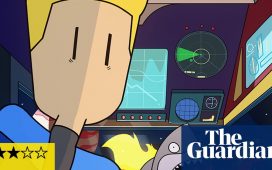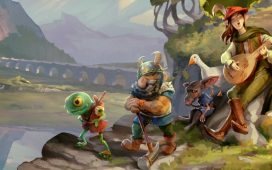Many, many people have stories about how video games have impacted them. It’s rarer for a series to be a continuous, changing influence on half of your life. And yet somehow Ace Attorney, a comedy game about lawyers, became bizarrely foundational to my teenage years – and then jarringly alien in my 20s. So when the original trilogy was remastered earlier this year, it felt like so much more than the chance to revisit a classic. It seemed an invitation to reflect on an influence lasting more than a decade, kicked off by a video game, that ended up nowhere near where I expected it to.
The first time I ever saw Ace Attorney being played, I was 12. The first game was already five years old, having made the transition from the Game Boy Advance to the Nintendo DS by the time I glimpsed it over a friend’s shoulder. She was playing one of the tense courtroom battles and, for reasons long lost to time, I was immediately hooked by the concept.
The investigative sequences were less interesting to me, but this was a blessing in disguise. My friend soon got fed up of calling me over when she was back to arguing her case in front of a judge, and I wasn’t understanding the story properly from those fragments anyway, so I picked up my own copy and tore through it, falling in love with the characters and story.
As invested as I was from the start, I could hardly imagine the impact these games would have on me. One of my dearest friends to this day is someone that I became close to after overhearing them mention the game at school. Both of our closets are full of clothes that might be called “wine” or “maroon” but which we exclusively refer to as “Edgeworth red” after the recurring prosecutor we both adore and his distinctively dyed suit.
But the biggest influence is how much I wanted to be a lawyer. In this, it wasn’t Phoenix but his mentor Mia Fey that drove me. Compassionate, dedicated, and hyper-competent to the point of getting her own murderer to confess in court (it’s a long story), she was everything that I wanted to be.
This wasn’t a passing fad used to shrug off the endless adults asking “what will you do when you grow up?” When I was 14, I started sitting in the gallery in my town’s courtroom. It wasn’t the shouting and drama of Ace Attorney, but I was still fascinated, taking notes in a hot pink flip pad about the cases, the arguments, and most of all the people.
When I was 16 I started studying the law at school, went to do work experience at the court, attended seminars for wannabe lawyers, and shadowed a barrister who happened to be a family friend. There’s a picture of me somewhere in the impossibly old-fashioned gown and wig of an English barrister – much less tasteful than the small golden badges of Ace Attorney’s lawyers. When I was 18, I went to study history at university, expecting to transfer into the law with a one-year course when I was finished.
Then I became severely depressed.
I don’t remember exactly how and when I stopped wanting to become a lawyer, but I do remember it being central enough to my sense of self that when I realised, I felt entirely adrift.
Still, Ace Attorney provided something. I played the fifth game in the main series, Dual Destinies, in a summer where I did little but stay in bed with video games. I couldn’t find it in myself to like it very much, but it did have one thing going for it, and her name was Athena Cykes. The series has always had various young women play peppy sidekick to the leading lawyer, but Athena took sunshine optimism to a new level, and I loved her for it.
I’m not here to say that a video game character lifted me out of my depression – I have medication and therapy to thank for that. But all I needed from Ace Attorney at that time was for it to be a pleasant distraction, and Athena provided it.
2016’s release, Spirit of Justice, was a different story. Though I’d wrestled my brain chemistry into a more positive place, graduated, and begun the very fledgling stages of this career, I still felt unmoored. A ten-year ambition isn’t so easily forgotten, especially when confronting the complexities of post-graduate life for the first time. I was in completely the wrong place, mentally, to be picking up the latest game in the series that had kicked it all off, and though I played the whole thing, it was impossible to see it as anything but a mirror of my own history. I could barely tell you what happens in the game, only that I felt utterly at odds with something that should have been so familiar. It was like coming home to find out your roommate suddenly only speaks French, or, rather, realising they’re still speaking English but you’ve forgotten how to.
Even three years later, picking up the remastered Ace Attorney trilogy, I was holding onto a similar idea. Surely this mirror, taking me back to the very beginnings of this journey, would hold the answers to that dissonance I felt. I would be able to find something profound about myself in the replaying, like an archaeological dig through my own life that would turn up a treasure that would make sense of the whole thing.
Unsurprisingly, it doesn’t work that way. Replaying a video game can’t tie off all the loose ends on something so complicated. Or, maybe, not doing so was the only way that it could.
Starting over, I could quickly tell that I had been wrong to expect so much. I’ve talked for a thousand words to this point about my relationship to the series and I’ve still only touched on the very surface, so every case held memories and complicated feelings that I could only address by admitting that they weren’t going to get a neat and tidy resolution just because I’d come back to the start.
But realising that meant that I got to enjoy them for what they are. And, everything else I feel about them aside, they’re just good games. There are some bits that raise eyebrows now that I’m older and more aware, like how repulsed characters are by the effeminate gay man Jean Armstrong, or how one particularly weak case hinges on three separate men in their 20s and 30s being in love with a 16-year-old girl. But equally, there are things I appreciate now that I couldn’t properly understand before, like how the game’s legal system intentionally reflects the truly broken nature of the law both in Japan and worldwide.
Ultimately, I find myself going back to Athena Cykes. Sometimes the best thing to do is shelve the deep personal significance and let a video game just be a video game. That doesn’t mean it’s not important. A game can simultaneously be a huge part of your childhood, an inspiring if sometimes faltering look at injustice, and a fun story full of ridiculous characters and even sillier puns. None of those things need to get in the way of any of the others.
With that in mind, I’m going to keep playing the rest of the games in the series, making my winding way back to Spirit of Justice to give it the chance that I couldn’t before, weighed down with so many expectations.
After all, I’ll never be Mia Fey, but I’m also not planning to stop wearing Edgeworth red anytime soon.














